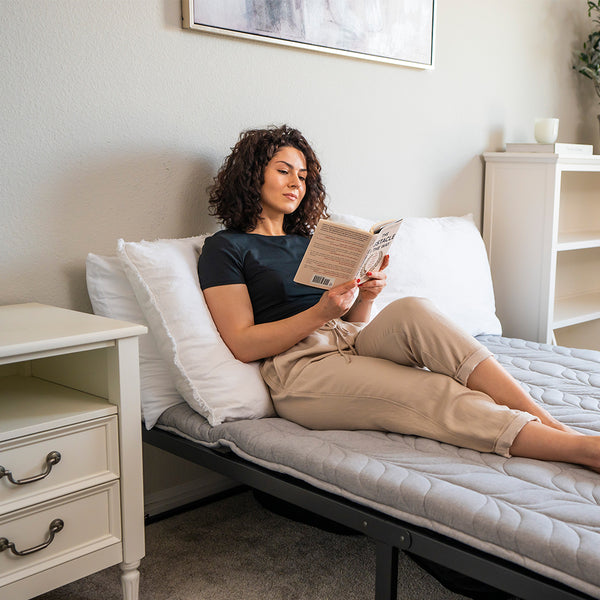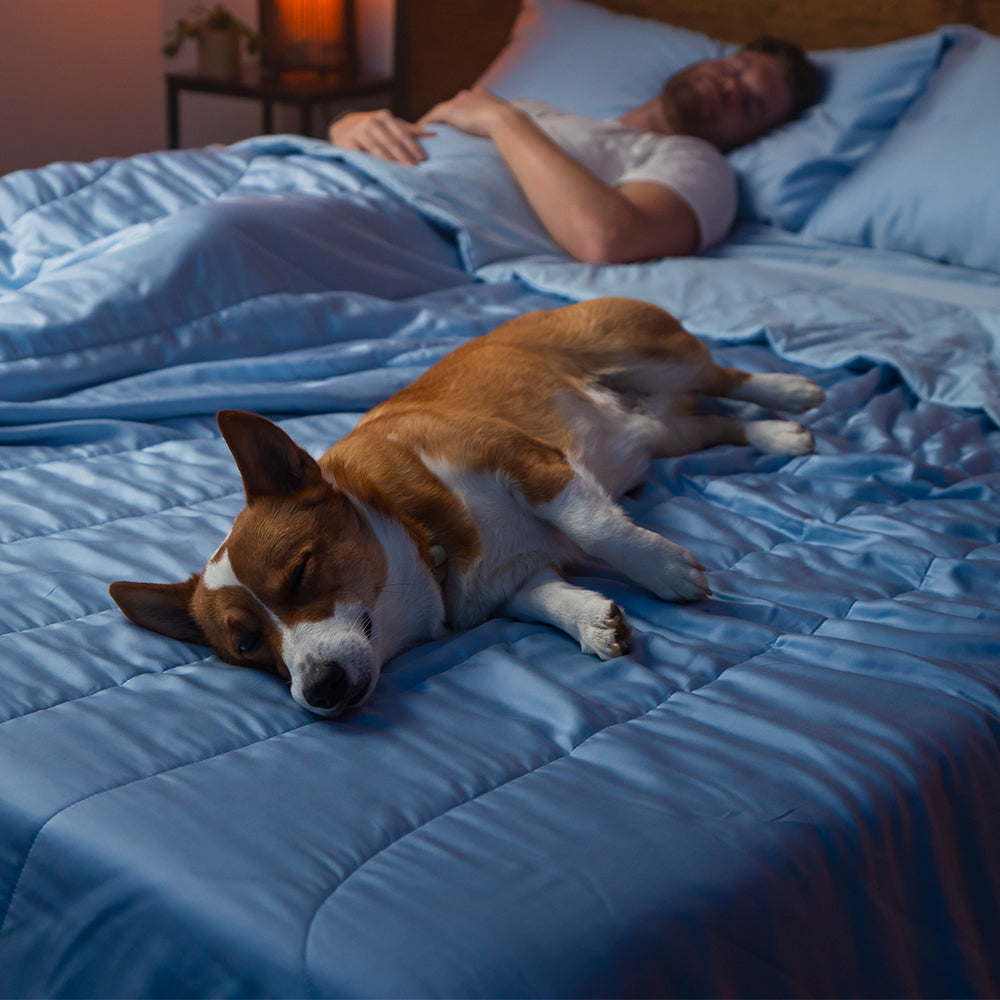Are you struggling to drift off to dreamland? Whether you're buzzing from caffeine too late in the day or grappling with pre-trip jitters, discovering how to make yourself tired can transform your sleep quality overnight.
Dive into our guide for foolproof ways to solve the question “How can you make yourself tired?” ensuring you wake up refreshed for whatever the day has in store.
Kickstarting Your Journey to Dreamland: How Can You Make Yourself Tired
Our sleep issues often stem from poor evening habits that keep us wide awake. A solid nighttime routine is your first step in learning how to make yourself tired, aiding in syncing your circadian rhythm for optimal rest.
Dos:
- Indulge in Warmth: A warm bath or shower not only relaxes but also boosts circulation, helping you cool down faster and fall asleep more easily.
- Yoga: Studies show yoga combats insomnia-related issues, easing sleep initiation and awakenings.
- Cool It Down: The ideal bedroom temperature is between 60 and 67 degrees Fahrenheit for optimal sleep. Using a cooling blanket can be a good way to cool yourself down for better sleep, especially if you tend to overheat during the night. Cooling comforters are designed with materials that help regulate body temperature and wick away moisture, creating a more comfortable sleeping environment.
- Sock It Up: Do you have cold feet? Wearing socks in bed can enhance circulation and signal your body that it’s time to rest.
Don'ts:
- Late Night Dining: Eating right before bed can rev up your digestive system and energy levels, making it hard to fall asleep. Opt for light snacks if needed.
- Limit Fluids: Reduce caffeine and alcohol. Even water intake should be minimized to prevent late-night bathroom trips.
- Blue Light Ban: Put away those phones and tablets; the blue light emitted keeps you alert and disrupts sleep.
Accelerating the Sleep Process

Are you looking to feel tired faster once in bed? Forget about sleeping pills or counting sheep; try these effective strategies instead.
- Progressive Muscle Relaxation: Begin with your facial muscles, moving down to your toes. Tense each muscle group for a few seconds, and then release. This not only relieves stress but also prepares your body for sleep.
- 4-7-8 Breathing: This technique involves inhaling for four seconds, holding your breath for seven, then exhaling for eight. Repeat at least four times to relax fully.
- Weighted Blanket: The deep touch pressure from a weighted blanket releases serotonin and dopamine, easing anxiety and facilitating sleep.
- Chamomile Tea: A calming brew, chamomile tea’s flavonoids promote sleepiness. A few sips might be all it takes to relax you.
- Read a Book: Choose a book over a screen to avoid blue light. Avoid thrillers that beg for "one more chapter."
- Reset if Needed: Can't sleep after 15 minutes? Get up, do something calming, such as reading a book, listening to soothing music, practicing deep breathing exercises, or gentle stretching, and then try again. It can be more effective than staring at the ceiling.
Understanding Your Body's Clock
Your body operates on a circadian rhythm, an internal clock that dictates your sleep-wake cycle over 24 hours. Adjusting this internal clock can be crucial for tossing and turning at night.
Exposure to natural light during the day and dimming lights as evening approaches can help reinforce your body's natural sleep-wake cycle. Moreover, consistent sleep schedules, even on weekends, can train your body to feel tired at the right time.
Mindfulness and Meditation
Mindfulness and meditation can be powerful tools in your quest for sleep. Practices such as mindfulness meditation have been shown to reduce stress and improve sleep by calming the mind and body.
Even a short practice of 10 to 15 minutes before bed can prepare your mind for sleep, making it easier to let go of the day's stresses and slip into restfulness.
The Role of Aromatherapy
The soothing power of certain scents should not be underestimated when considering how to make yourself tired. Lavender, in particular, has been widely studied for its relaxation and sleep-promoting effects. Incorporating lavender-scented candles or essential oils into your evening routine can signal your brain that it's time to wind down, aiding in quicker sleep onset.
Dietary Considerations
While it's well-known that caffeine and heavy meals can disrupt sleep, incorporating sleep-friendly foods into your diet can also affect how quickly you fall asleep.
Foods rich in magnesium, such as almonds and spinach, and those containing tryptophan, like turkey and dairy products, can promote sleepiness. Small changes like reducing sugar intake and increasing water consumption throughout the day (but not too close to bedtime) can improve sleep quality.
Sleep Environment Optimization
Your sleep environment is crucial to your ability to fall asleep quickly. Consider factors like room darkness, noise levels, and temperature. Blackout curtains, earplugs, and a room kept at a cool temperature can create the ideal conditions for sleep.
Furthermore, investing in a high-quality mattress and pillows that support your preferred sleeping position can significantly enhance your comfort and, thus, your ability to fall asleep quickly.
FAQs
How can you make yourself tired naturally?
Start with a calming bedtime routine that relaxes your mind and body. At least an hour before bed, limit your caffeine intake and exposure to electronic devices. Engage in relaxing activities, such as reading a book or practicing gentle yoga, to signal your body it's time to wind down.
Can food or drinks help make me tired?
Indeed, certain foods and drinks possess properties that can encourage sleepiness. Chamomile tea, nuts, and a warm glass of milk contain compounds that relax the body and mind. Integrate these into your evening routine for a smoother transition to sleep.
Is exercise good for sleep?
Yes, regular, moderate exercise can significantly enhance sleep quality. It helps regulate your sleep-wake cycle and reduces stress. However, it's important to avoid intense workouts close to bedtime, as they can energize you, making it harder to fall asleep.
How does light affect my sleep?
Exposure to natural light during the day boosts your mood and regulates your circadian rhythm. As evening approaches, minimizing exposure to artificial light, incredibly blue light from screens, can help signal your body that it's time for sleep. This practice can make it easier for you to fall asleep and improve the quality of your sleep.
Can a bedtime routine make a difference in how quickly I fall asleep?
Absolutely. A consistent bedtime routine helps signal your body and mind that it's time to wind down, preparing you for sleep. It can include dimming the lights, engaging in a relaxation activity, and going to bed at the same time every night, which collectively can significantly speed up the time it takes to fall asleep.
What's the best temperature for sleeping?
The ideal bedroom temperature for most people to sleep comfortably is between 65 and 68 degrees Fahrenheit. A cooler room helps decrease your core body temperature, a signal to your body that it’s time to sleep. Adjust your thermostat accordingly to find what's best for you.
How important is my sleep environment?
Your sleep environment is crucial for ensuring a good night's rest. Factors such as noise, light, and temperature should be optimized to your preference. A comfortable mattress and pillows tailored to your sleeping position can also significantly improve sleep quality.
Final Thoughts
So, how can you make yourself tired? Mastering the art of falling asleep quickly doesn't require complex solutions or medication—it's about setting the right conditions and employing simple, effective techniques.
By fine-tuning your sleep environment, adopting relaxing pre-sleep rituals, and utilizing natural methods like progressive muscle relaxation and controlled breathing, you can significantly improve your ability to fall asleep swiftly and enjoy a deeper, more rejuvenating night's rest.
Embrace these strategies as part of your nightly routine to transform your sleep from elusive to effortless. Remember, consistency is the cornerstone of success in achieving better sleep hygiene. So, bid farewell to restless nights and welcome a future of peaceful, restful slumber.

